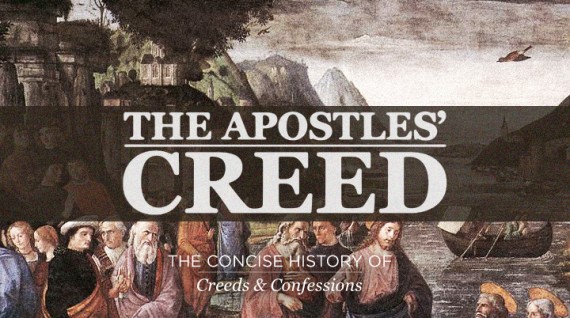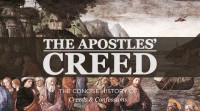
It is historically uncertain when, where, and how the first doctrinal statements were developed. But we do have some clues.
Scriptural Doctrinal Statements
It is likely that some of the first creeds are found in Scripture, in passages like Philippians 2:5-11, 1 Corinthians 15:3-6, and 1 Timothy 3:16. However, some believe that these were not exactly creeds, but were hymns. Furthermore, and I will return to this point later, these Scriptural statements are not exactly creedal confession of doctrine, but are summaries of stories about Jesus. They are narrative summaries; not doctrinal summaries.
Also, some like to point to the statement that came out of the Jerusalem council in Acts 15:23-29 as an early statement of belief. And while this statement from the church leaders is not a summary of the life of Jesus, it is not a doctrinal statement either. It is not a statement of beliefs, but a statement of behaviors. It is not telling Gentile Christians what they must believe, but rather, telling them what they must do.
Both of these points, that early statements were based primarily on the narrative of Scripture and the behavior of believers, will become critical later in this chapter for understanding how we as twenty-first century followers of Jesus can stand up for the truth without the damaging and destructive statements of doctrine that have divided Christianity for so long.
Church Doctrinal Statements
Once we get outside of Scripture, we see other doctrinal statements develop rather quickly as well. There are two statements that developed quite early, the Nicene Creed and the Apostles’ Creed. Some believe that the Nicene Creed was first, but I tend to believe that it was preceded by the Apostles’ Creed, even though the Apostles were probably not the ones who wrote it.
 The Apostles’ Creed says this:
The Apostles’ Creed says this:
I believe in God the Father Almighty,
Maker of heaven and earth:
And in Jesus Christ his only Son our Lord,
Who was conceived by the Holy Ghost,
Born of the Virgin Mary,
Suffered under Pontius Pilate,
Was crucified, dead, and buried:
He descended into hell;
The third day he rose again from the dead;
He ascended into heaven,
And sitteth on the right hand of God the Father Almighty;
From thence he shall come to judge the living and the dead.
I believe in the Holy Ghost;
The holy Catholic Church;
The Communion of Saints;
The Forgiveness of sins;
The Resurrection of the body,
And the Life everlasting.
Amen.
This is a good doctrinal statement. And if this is where doctrinal statements had stopped, I would not be writing this chapter. The Apostle’s Creed is simple, concise, and comprehensive. It contains most of the basic beliefs of Christianity, and there is nothing in there that the majority of Christians throughout history would disagree with. Yet this is also its flaw.
The Problem of Doctrinal Statements
The statement is not as precise as we would like about many things that are considered “essential beliefs” by many Christians. For example, though the Father, Son, and Holy Spirit are mentioned, the statement does not talk about their Trinitarian relationship. Furthermore, the statement is ambiguous about the full divinity and humanity of Jesus, or his sinlessness and pre-existence. And while it does mention belief in the Holy Spirit, the church, the forgiveness of sin, the resurrection of the body, and life everlasting, it doesn’t say what is believed about these things, or how they are obtained, or any such ideas. Finally, the statement says absolutely nothing about the Bible.
The issue before us, however, is not really what it says, but why it was written. If God has given us Scripture, why do we need doctrinal statements? The various answers are numerous and complex, but ultimately, it comes down to one main thing. The church began to develop doctrinal statements in order to know who is “in” and who is “out.” Throughout history, people disagree on what Scripture actually teaches, and so doctrinal statements were written to serve as a guide for the proper interpretation and understanding of Scripture.
Honestly, this sounds like a good idea, as it seems that the goal is to create unity within the Body of Christ. The problem, however, is that the opposite happened. Instead of bringing about unity and love, doctrinal statements created division and strife instead. People began to use doctrinal statements as a way of deciding who was a true believer, and who was not. They used creeds to determine who belonged to the church, and who did not. So although unity was the goal of doctrinal statements, division was the actual result.

We are at the place today where there are thousands of groups and denominations, with little unity or love between us. We will look in the next post at how this happened.




I am nowhere to be found on that flowchart
Swanny,
Then maybe you are not part of the true church!
The family tree is interesting. What I grew up in is on there, but where I am is not. 🙂
Also, the chart leaves the Coptics out. Is there some significance in that? {tongue in cheek}
I don’t know why Coptic are not on there. I didn’t make the chart. They would fall somewhat under Eastern Orthodox, right?
Actually, they would branch off before Roman Catholic, I think….
I looked it up. You are right. It was prior to that break.
I couldn’t say how true this post is. I have experienced devisiveness over doctrinal statements and creeds alike. Even when they have been introduced to foster unity, for some reason they both tend to divide. Mostly, because there are always disagreements. I am guilty of being divisive over these things.
You know, another angle on this is the divisiveness creeds have caused between Jew and Gentile in the ekklesia. I am a Jewish believer and am startled by the historical background of certain creeds. For instance, Constantine decided to ban sabbath and feasts in the name of Yeshua, so as not to associate with “the Jews.” How hard it is for me to look highly upon anything that comes from that era (yes I use the canon . . . but you get my point, lol).
Such decisions have resulted in the persecution of Jewish Yeshua believers and unbelievers alike. Terrible events have occured and still occur to this day. And our theology suffers because of it.
All because Constantine and other high church councils decided to develop a giant doctrinal statement/creed . . .
This is not to say that no good has come from these historical statements. But, so has a lot of bad . . . a lot of bad that is kind of pushed under the rug. Sad really.
Josiah,
Thanks for the comment. You make great points about the dangers and pitfalls of doctrinal statements.
There are some benefits to them, especially some of the earlier ones. But I think there is feature of those earlier doctrinal statements that are absent from most creeds and confessions from today. I will try to point this out in later posts.
P.S. I enjoy a lot of your posts. keep it up.
Exactly.. you cannot flowchart the Holy Spirit
Sadly, this is a very astute explanation of denominational division. Nicely put, but it saddens me that such blatantly semi-biblical writings have invaded and maimed the Body of Christ.
Jon,
It is sad. But on the other hand, I am sure there are many who would say that such writings are not anti-biblical at all, but accurately represent biblical teaching.
Then we start arguing about it… and pretty soon, we have doctrinal division and strife all over again.
I definitely think that a lot of Creeds and Doctrinal statements begin with Biblical teaching. I didint mean to sound as though they were other than such. I guess my meaning was that where they may BEGIN in sound Biblical teaching, we humans tend to take our personal view point, wrap it up in a blanket statement, and then find people who think the same and huddle up. I think is the positive side of such “decrees,” if you will, of what we believe- that we find like-minded Brothers and Sisters to hold us up. But you hit the nail on the head with the other side; the “in” and “out” crowd.
I have often told people I work with that I believe denominations to be one of the great tools of the devil in the Body of Christ today; NOT that it was his design, but that he has found a way to use them to divide us so cleanly, almost surgically. Now we separate ourselves accordingly at parties and gossip about the others.
Jon,
Denominationalism certainly is dangerous and divisive! I think Paul pretty clearly condemns an early version of it in 1 Corinthians 3. And as you point out, creeds are one of the leading factors in creating denominations.